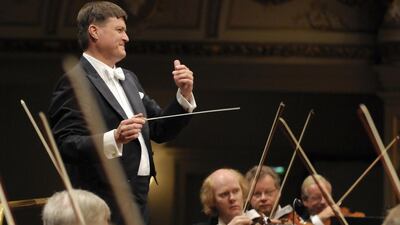It is a testament to the cultural strength of Abu Dhabi Classics that even after a three-year hiatus, organisers of the revived concert series managed to convince one of the world’s oldest orchestras to perform two concerts in the emirate – in Abu Dhabi on Tuesday, February 17, and in Al Ain on Wednesday, February 18.
Established in 1548 in Dresden, Germany, the Staatskapelle Dresden is 467 years old this year. Christian Thielemann, 55, its principal conductor since the 2012-13 season and the artistic director of the Salzburg Easter Festival, is renowned for his mastery of the German romantic repertoire.
In 2011, an international jury named him Conductor of the Year. Two years later, the Staatskapelle Dresden was voted Orchestra of the Year by a panel of 50 international music critics.
If there was ever a dream team in classical music, this is it. Thielemann spoke exclusively to The National just minutes before boarding his flight to Abu Dhabi.
You will be conducting Staatskapelle Dresden in Abu Dhabi. What qualities do you look for when choosing an orchestra?
I care about the tradition of the orchestra, the sound of the orchestra – that is how it has always been with me. Nowadays, I don’t choose them as much because I do not conduct so many different orchestras anymore. The ones I do conduct, I already have a long relationship with.
What is behind the uniquely cultivated sound of the Staatskapelle Dresden?
Many things. It has to do with the opera tradition of the Dresden orchestra, because it is mainly an opera orchestra that plays this romantic repertoire on a very high level and has done so for a long time with many famous conductors. Also, we take people who really fit into the orchestra – the choice is not only to do with technique but also with sound and the feeling of the musician.
What led to you becoming a master of the late Romantic era – of Brahms, Wagner, Strauss, Schumann etc?
I grew up with this music. I mean, I grew up with other music, too, but my career began with this music and I was asked to do it more and more. It is true that if you do the pieces often then you are more and more in the repertoire, but every time it is different. There are different interpretations because I am flexible as a conductor and the orchestra itself is also flexible, it is their tradition. What we end up doing depends on the evening, on the atmosphere, on how we feel, on everything around us.
As chief conductor of the Staatskapelle Dresden since the 2012-13 season, how has the experience been so far?
I have taken so much from them. It is the way they are playing and the way they are offering me the music. I listen very carefully to what they do and they certainly take from me things that they expected me to do, to rehearse properly and to have ideas for the programmes and to also move forward and interpret together. It is a collaboration.
Which do you prefer and which do you think is easier: to train your orchestra to perform a new piece, or to retrain them to perform a piece they are well acquainted with but along the lines of your interpretation?
A new piece is a new piece for everybody, but if you do something they know very well, you have to rehearse in a very different way because they have their traditions and I have my ideas. There are challenges to both and I am happy to do both – it is just a different approach.
Your Abu Dhabi programme includes daring pieces such as Richard Strauss's Metamorphosen – Study for 23 Solo Strings, and Anton Bruckner's Symphony No 9. For Al Ain you chose Franz Liszt's symphonic poem Orpheus, Richard Wagner's Siegfried Idyll and Strauss's majestic tone poem, A Hero's Life. What has made you open your UAE account with such a challenging repertoire?
We want to present this programme in Abu Dhabi because we think it has not been heard often. We feel we are bringing over something new which has to do very much with our traditions and which will be original for the UAE. Plus we are excited, we want to know the country that we come to and we are so happy to be there. In fact, now my plane is leaving and I have to board, so see you in Abu Dhabi.
• Tickets to Symphonic Concert 1: Strauss-Bruckner at the Emirates Palace on Tuesday, February 17, at 8pm are sold out. Tickets for the Symphonic Concert 2: Liszt-Wagner-Strauss performance on Wednesday, February 18, at Al Jahili Fort in Al Ain are available at www.ticketmaster.ae
artslife@thenational.ae

